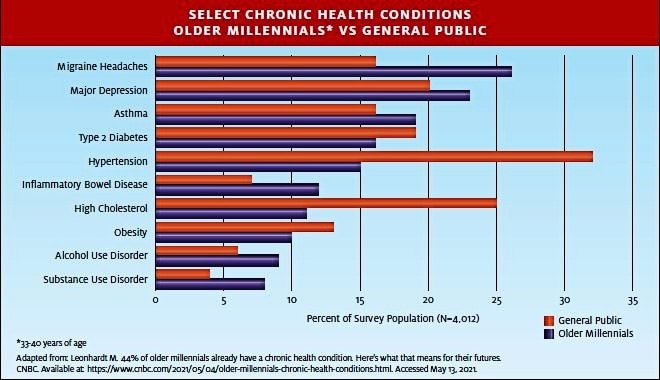There’s no gentle way to put it: Members of the Millennial generation simply are not as interested in having a traditional relationship with a primary care provider as their predecessors have been. That shouldn’t be surprising, though, given that each successive generation seems to drift farther from that model of care. Where 82% of Baby Boomers (those born between 1946 and 1964) report having a primary care provider, the same can be said for only 74% of Gen Xers (1965–1980) and just 65% of Millennials (1981–1996).1
Here’s what’s interesting about the Millennials, though: If you were paying attention, you noted that the first batch of Millennials are turning 40 this year. And as they creep toward middle age, they’ll need more than just episodic care in growing numbers.
That trend has already begun, actually. According to researchconducted by The Harris Poll, at the behest of CNBC, roughly 44% of Millennials born
between 1981 and 1988 report having at least one chronic health condition already.2 Given these patients’ apparent disdain for having a “regular” doctor, this could be a golden opportunity for urgent care providers who are well versed in conditions that would typically be treated in a traditional primary care environment.
Check out the graph below to see which conditions we’re talking about, specifically.
- Employee Benefit Research Institute. Attitudes toward primary care providers differ by generation. Available at: https://www.ebri.org/docs/default-source/infographics/46_ig-cehcs2-6feb20.pdf?sfvrsn=64793d2f_4. February 6, 2020. Accessed May 13, 2021.
- Leonhardt M. 44% of older millennials already have a chronic health condition. Here’s what that means for their futures. CNBC. Available at: https://www.cnbc.com/2021/05/04/older-millennials-chronic-health-conditions.html. Accessed May 13, 2021.

